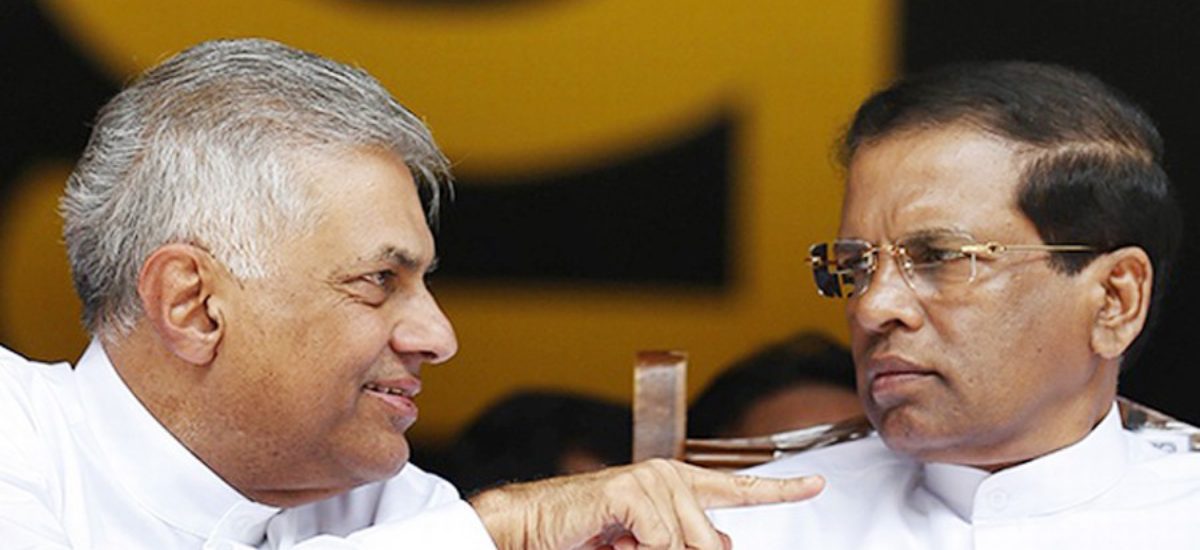Photograph courtesy Ada Derana
August 19th was the first anniversary of the National Unity Government elected after the last general elections and several political issues have dominated the recent news, especially the Office of Missing Persons (OMP) Act and the recent removal by the President as SLFP leader of Joint Opposition SLFP members from their posts as party organizers. Losing their posts were JO stalwarts Kheliya Rambukwella, CB Ratnayake, Pavithra Wanniarachchi, Gamini Lokuge, Mahinda Yapa Abeywardana and Jagath Balasuriya. Dallas Allaperuma and Bandula Gunawardena have announced their intention to resign, a wise move to do so, before they are also likely removed.
The most underlying feature of the Sirisena / Wickramasinghe Administration is that it is a unique unity experiment between the two major political parties which have alternatively governed this country since independence the United National Party (UNP), led by Prime Minister Wickramasinghe and the Sri Lanka Freedom Party (SLFP) led by President Maithripala Sirisena. What this has done, is pushed the third placed Tamil National Alliance (TNA) to the official opposition position for the first time since 1977 and more importantly created a very broad based government which has over two thirds support in Parliament and consequently able to carry through on a reform agenda, as demonstrated by the unanimous decision of parliament to be a constitutional assembly which will institutionalize and codify all reforms through a constitutional for Sri Lanka.
The German Experience
The practice of the two largest parties in the country and in parliament coming together to form, what might be termed a “grand national coalition” is not an unusual, phenomena in the world and while not common, is also found in other places. The best example would be Germany, where the Christian Democrats of Chancellor Angela Merkel and the Social Democratic Party, the two largest parties in that country have been forming grand national coalitions now on several occasions and likely to do so again in federal German elections due next year. The parties govern together and then separate to contest the elections. The parties are well established with their own ideologies, the Christian Democrats essentially the conservative right of center party and the Social Democrats as their name implies are left of center. Similar experiences exist in other countries with parliamentary democracies too, mostly in Europe.
Asserting control the slow and steady way
President Maithripala Sirisena has his own style and at times challenges Machiavellian orthodoxy for achieving and increasing control. Right after the presidential elections in January 2015, a shell shocked SLFP abandoned the defeated Rajapakses and moved over to President Sirisena. The nay Sayers existed even then but President Sirisena choose the less travelled path of refraining from taking drastic action against his political detractors and as party general secretary Minister Duminda Dissanayke said recently quietly watched and slowly took action. What has been occurring has been a slow but steady process of asserting control and slowly marginalizing the SLFP faction opposing his administration and supporting the joint opposition of former President Rajapaksa.
A new political formation and local government polls
The political strategists of the Joint Opposition, who regularly vow to come to power very soon, in much the same way as the old leftist firebrands used to promise that the revolution was around the corner, in the iron curtain era gone by, are staking their hopes on a new political formation led by former President Rajapaksa and contesting the local government and perhaps some provincial polls due next year. The strategy has a few serious weaknesses. Firstly, Sri Lankan politics is very unkind to third forces in general and breakaway factions in particular. The JVP despite a very clear and distinct leftist identity has struggled to pose a democratic regime change challenge to the government securing only seven seats at the last election. The most significant previous breakaway from a main party was the Lalith Athulathmudali and Gamini Dissanayke led breakaway from the UNP, styled the Democratic United National Front (DUNF). It contested the first provincial council polls held after it was formed and secured 13% of the popular vote nationally, a remarkable performance but nonetheless had no staying power and is no more today.
Why the JO which essentially lost two elections last year with President Rajapaksa leading the fray believe that they would be third time lucky is unclear. One definition of lunacy is to do the same thing over and over again and expect a different result. The Rajapaksa message has not changed, strident ethno-nationalism with barely disguised racism will not produce any local government victories. Local government elections are not elections which change governments and hence always difficult to generate enthusiasm for voter turnout among opposition supporter. Further the first provincial council election due is the Eastern Province in mid-2017, an election in which the generally minority bashing, strident majoritarian nationalism of the Joint Opposition does not carry any appeal. The Muslim electorate of the Eastern Province would hardly be unaware that since last year’s January 8th election, there has not been a single act of mob violence against mosques or places of minority religious worship. From a perspective of political violence, it also demonstrates remarkable command and control over violence, that an election result could stop political violence in its tracks. Sri Lankan democracy has been the winner, one year on for the national unity government.
(The writer is Advisor, Ministry of Foreign Affairs. The views expressed are personal.)

